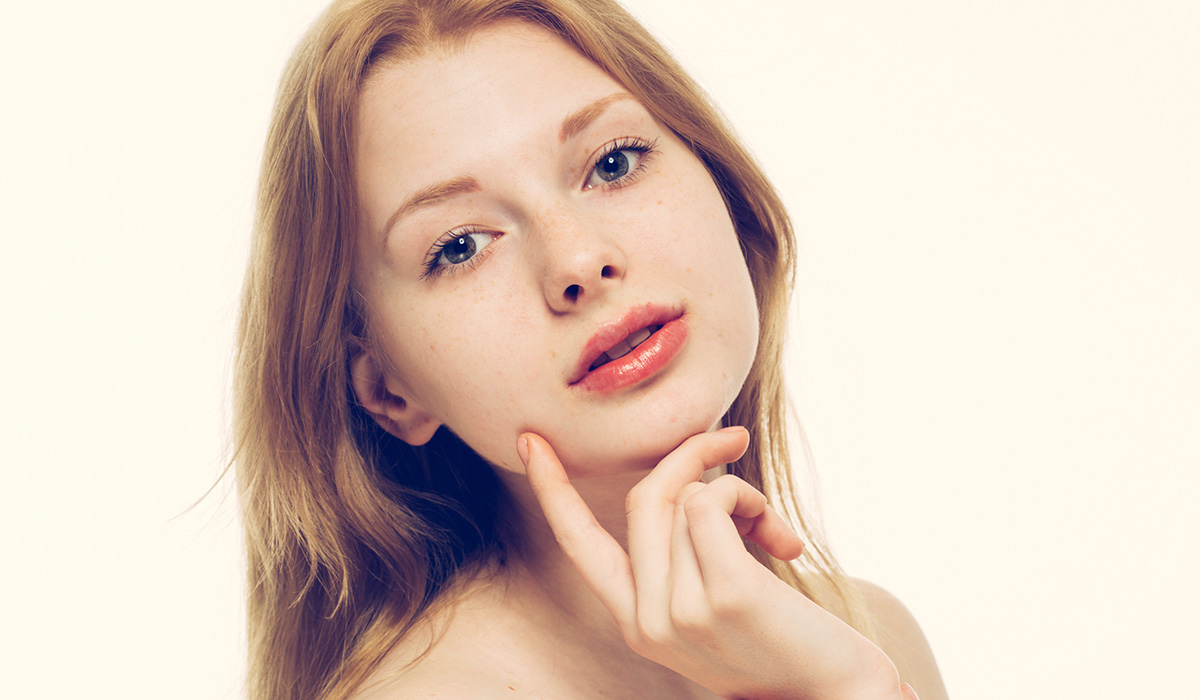Having acne-prone skin is hard enough – let alone areas of dryness to boot.
I have a rather dry chin and cheeks, yet tend to get breakouts around the sides of my mouth – so I’m all too familiar with the struggle of trying to treat those pesky blemishes without over-drying other areas of your face!

The good news? This combination skin struggle is actually pretty common – and it’s also treatable.
I spoke to Education Manager for the International Dermal Institute and Dermalogica, Emma Hobson, as well as DMK Director of Education, Debbie Dickson, about how the two issues are related and what you can do to treat both (without exacerbating either). Here’s everything you need to know…
1. Skin dehydration is common in acne sufferers
According to Emma, “[Skin] dehydration is very common for all skin types but often it appears on acneic skin for a few reasons.” Causes include prescription acne medication, harsh skin care products, incorrect use of spot treatment products and skipping moisturiser.
Debbie adds: “The issue is water! Acne sufferers’ skin is dry due to a fast cell turnover coupled with trans-epidermal water loss (TEWL), which means they do not have enough free water levels in their skin.” According to Debbie, this leads to “a build-up of dead redundant cell material that makes [their skin] feel rough and dry”.
RELATED: The worst skin care mistake you can make
2. SD alcohol is a no-no
Emma warns that “products that are too harsh and stripping such as toners and clarifying lotions with SD alcohol” can exacerbate the condition. Debbie agrees, saying the resulting lack of water in the skin intensifies the issue, as “the oil isn’t pushed up onto the skin’s surface” where it’s supposed to be. Instead, it clogs and creates more blackheads and congestion.

3. A multitasking skin care regimen is key
“It is important to keep in mind all of the dysfunctions and imbalances that you are trying to equalise in this condition when choosing an effective home care routine,” says Debbie. Because acne is an “inflamed, infected condition”, you will need products that contain anti-inflammatories and ingredients that help regulate oil flow and cell turnover, as well as ingredients that kill acne-causing bacteria, without drying your skin.
RELATED: How to make your beauty products work harder
Emma recommends the following steps to help improve your skin:
Exfoliation: “For acne breakouts and dehydration, use products that contain hydroxy acids, in particular salicylic acid. Note you should never use these directly over a breakout.”
Try: Paula’s Choice Clear Regular Strength Anti-Redness Exfoliating Solution, Bioré Blemish Clearing Scrub
Treatment products: “Overnight clearing gels and spot clearing treatment products are helpful as you can put them directly on a spot or area of breakouts to help heal them quickly.”
Try: DMK ACU-THERM, Nutrimetics Clear Spot Correcting Gel
Hydrating spray: “[This is] a must for throughout the day. It will keep your skin evenly hydrated and help stop those unpleasant dry, flaky patches from reappearing.”
Try: Sukin Hydrating Mist Toner, Puretopia Refresh & Balance Hydrating & Soothing Facial Mist & Toner
Moisturiser: “Look for a non-comedogenic ‘treatment’ moisturiser that doubles as a sunscreen. Bonus points if it’s lightweight, oil-free and contains ingredients to control oil production and prevent/treat congestion and breakouts.”
Try: Dermalogica Clear Start Skin Soothing Hydrating Lotion, Cetaphil Dermacontrol Oil-Free Facial Moisturising Lotion

RELATED: 7 products that’ll help you get rid of pimples
4. Professional grade treatments can help
As far as in-salon treatments go, Emma recommends “a course of professional grade exfoliation, in particular a chemical peel or professional exfoliation that combines digestive enzymes with hydroxy acids which includes salicylic acid.” This is particularly good “in combination with LED blue light” which helps heal breakouts. The expert also advises you opt for a therapist who has “recently received training in this arena, [as] it’s important to keep your skills up to date when treating this condition.”
RELATED: 5 signs you should get a facial
5. It’s not all about skin care
According to Emma, the most important thing (other than skin care products) when it comes to this condition is diet.
Try to avoid:
– Processed foods
– Chocolate (for those who recognise it as a trigger)
– Cow’s milk (even organic)
– Fruit (in excess of the recommended two pieces a day)
It’s also best to avoid excessive exposure to the sun, harsh air-conditioning or heating (try using a humidifier instead), frequent long haul flights and smoking.
Load up on:
– Foods rich in essential fatty acids such as walnuts, almonds, olive oil and green leafy vegetables (DMK EFA+ – Essential Fatty Acids Supplements is also formulated for an extra boost
– Water and herbal teas
Debbie also warns against “oil-based make-up, as bacteria loves to breed in an oil-based foundation.” Try an oil-free foundation such as Clinique Superbalanced Makeup Oil-Free Formula or Chi Chi Flawless Foundation.
RELATED: Foods for clearer skin
Do you have dry, acne-prone skin? What’s your biggest skin care concern?




